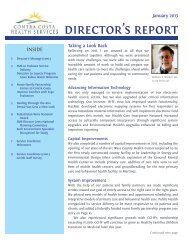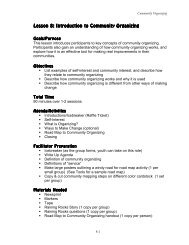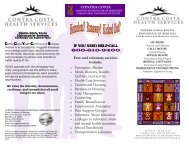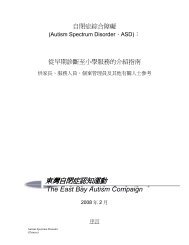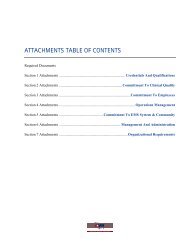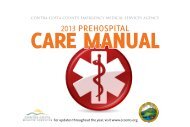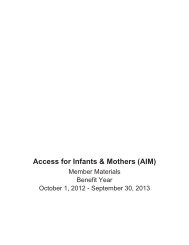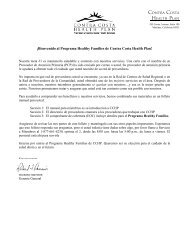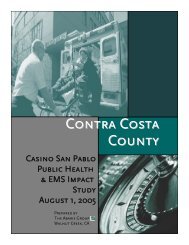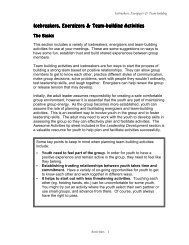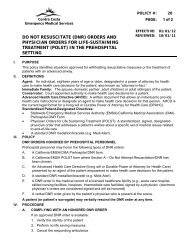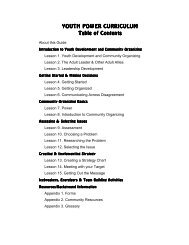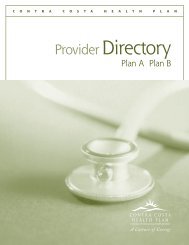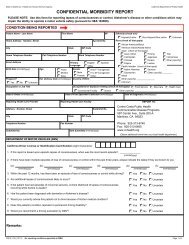EMS Policy Manual - Contra Costa Health Services
EMS Policy Manual - Contra Costa Health Services
EMS Policy Manual - Contra Costa Health Services
Create successful ePaper yourself
Turn your PDF publications into a flip-book with our unique Google optimized e-Paper software.
<strong>Contra</strong> <strong>Costa</strong><br />
Emergency Medical <strong>Services</strong><br />
POLICY #: 32<br />
PAGE: 2 of 3<br />
B. Interagency <strong>EMS</strong> Events<br />
To allow for prompt review and follow-up, communication of events should occur between the<br />
involved agencies. Each agency is responsible for its own internal review and follow-up. <strong>EMS</strong><br />
Agency staff is available to assist all participants in seeking solutions to patient safety events<br />
that affect the <strong>EMS</strong> system.<br />
C. <strong>EMS</strong> events that require review include:<br />
1. Any threat to public safety as defined by the <strong>Health</strong> and Safety Code 1798.200<br />
2. Medication related: incorrect drug choice, dosage, or route<br />
3. Equipment related: equipment problems, adverse events or failures related to patient care<br />
or <strong>EMS</strong> response<br />
4. Treatment or Procedure related such as:<br />
a. Difficulties, problems and unexpected events associated with procedures (e.g.<br />
known esophageal intubation)<br />
b. Events related to patient assessment or application of treatment guidelines (e.g.<br />
multiple attempts at interventions outside the number recommended by treatment<br />
guidelines<br />
c. Events related to interventions or procedures done that are not consistent with<br />
paramedic primary impression<br />
5. Scope related: situations in which an EMT or Paramedic scope of practice was not<br />
property followed.<br />
6. Patient Interaction related: Verbal or physical event identified which resulted or had the<br />
potential for harm, insult, neglect or abuse of the patient.<br />
V. RESPONSIBILITIES<br />
A. Prehospital personnel<br />
1. Assure patient safety by immediately notifying the hospital staff at the receiving facility and<br />
the base hospital (if involved), when an event impacts or has a potential to impact the<br />
patient.<br />
2. Immediately report event of concern to an on-duty officer or supervisor using the<br />
appropriate chain of command.<br />
3. Complete the <strong>EMS</strong> event form. Include verification of verbal reports on the form.<br />
4. Recommendations for corrective actions from the individuals involved are encouraged.<br />
B. Provider Agency<br />
Each agency shall have a process of fact-finding, follow-up and tracking of <strong>EMS</strong> events. All<br />
reported events regardless of significance should be reviewed and tracked as part of the<br />
provider’s quality improvement program.<br />
1. Assure patient safety first. Assure medical providers involved in the patient’s care at the<br />
receiving hospital and base station (if involved) have been informed of events that have<br />
the potential to impact patient care.<br />
2. Evaluate the event and notify the <strong>EMS</strong> Agency promptly regarding issues of public<br />
concern or that require urgent investigation.<br />
3. Provide the <strong>EMS</strong> Agency with additional written or verbal reports if requested.<br />
4. Take action to remediate the situation. Develop remediation programs (e.g., individual<br />
performance improvement plans) that offer appropriate and timely feedback, skills review<br />
and competency training.



